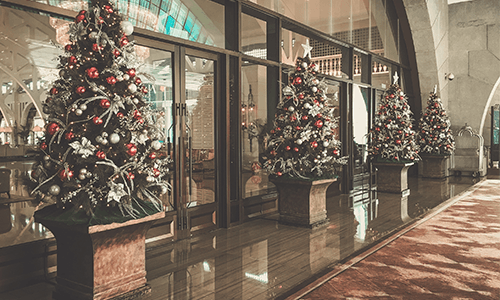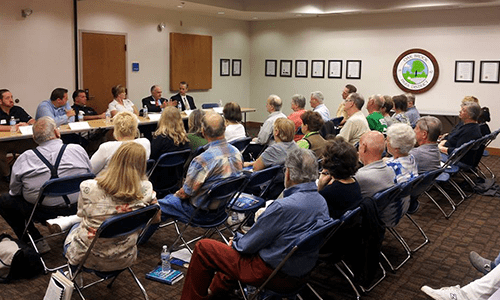The title of the article is tongue-in-cheek, to be sure, but like any “good” joke (we can debate whether the word “good” is appropriate here), there is a grain of truth behind it. The fact is, holiday decorations are an issue that all Boards must address, saddling the Board with the unenviable task of prohibiting certain decorations and potentially causing rancor among the Unit Owners who wonder why they cannot string lights on their balcony.
Given the pitfalls of trying to enforce decoration rules, why do Boards even put limitations on the residents’ abilities to decorate as they see fit? The answer boils down to two (2) main reasons: (1) the Board has an obligation to limit the Association’s liability and to protect the health and safety of the Association occupants and all visitors; and (2) the Board is responsible for the aesthetics of the Association by maintaining a uniform, cohesive “look” to the interior and exterior common elements. For these reasons, pursuant to section 18.4 of the Illinois Condominium Property Act (“Act”), an Association is permitted to adopt rules limiting items from being hung on common elements (including limited common element balcony railings) for both safety reasons as well as uniformity of appearance.
Decorations can fall and injure a person when improperly hung on the common elements by unit owners, resulting in liability exposure for the Association. Without a doubt, in such a case, both the Unit Owner who hung the falling decorations, as well as the Association, would be named in the resulting lawsuit, forcing the Association to defend itself for allowing the unit owner to hang the lights (whether or not the Association would ultimately be found liable would depend on the specific facts). One way to avoid the liability exposure is for the Board to adopt rules restricting the hanging of any decorative items from limited common element balconies, windows, or patios including planters, laundry, signage and holiday decorations, and to enforce those rules. Similarly, decorations placed in common elements hallways have the potential to become trip hazards which may violate building codes.
The Board also has to contend with the aesthetic issues raised by individual holiday decorations. In general, by deciding to reside in a community association, a person consents to a controlled visual environment subject to decisions by the Board. This doesn’t mean however that the Board should be able to prohibit all personal expression of an individual’s beliefs (indeed, the Illinois State Legislature agrees, which is why the Act was amended to prohibit Boards from promulgating any rule or regulation that prohibits a reasonable accommodation for religious practices which includes attaching religiously mandated objects to the front door area of a condominium unit). But the legislature allows Boards to balance the requirements of religious expression with the Association’s aesthetics. A uniform look to common element hallway doors, the building exterior, and patios and balconies contribute greatly to an association’s “curb appeal” and thus can impact the property values of the units therein. Thus, just like a Board may adopt rules dictating the specifics of an association’s permitted window treatments or front door paint colors, a Board may adopt rules limiting holiday decorations to maintain a uniform and cohesive appearance.
If the Association does not have any rules in its governing documents prohibiting a Unit Owner from affixing items to the windows or window frames or limited common element balconies, then technically the Association must allow any individual to hang holiday decorations, which can lead to issues. While the Board could argue in certain circumstances that certain items are a safety concern, it should consult with legal counsel before directing any individual to remove what could be considered a religious decoration as the unit owner is protected by Section 18.4(h) of the Act to permit the display of certain religious articles. Forcing one unit owner to remove a window display of a menorah while allowing other unit owners to put up Christmas lights or Kwanzaa kinaras may result in a discrimination lawsuit filed against the Association with the Illinois Department of Human Rights.
Finally, every year many Boards struggle with whether to include holiday decorations within common elements and the best practice for regulating religious displays within the common elements. Section 18.4 of the Act allows the Board to maintain the common elements, and thus the Board possesses the authority to decide what religious symbols (if any) may be displayed within the common elements. Most attorneys would recommend to a Board that does decide to allow religious symbols (such as a menorah or a Christmas tree), to avoid a discrimination claim by allowing any unit owner with a religious belief to include decorations from his/her organized religions (within reason). Any questions surrounding what should be permitted should be directed to the Association’s legal counsel. In the end, while non-secular displays in the common elements may be the safest route, many associations do prefer to allow certain secular decorations within the common elements. If the Board chooses to allow secular decorations, it should permit equal access for religious displays to avoid discrimination claims.
Ideally, besides the economic benefits of shared common expenses, living within a community association should promote an aspect of community and social benefit to residents, enhancing human interaction and individual expression which includes the celebration of holidays and certain religious symbols, from Chanukah to Diwali. But again, certain limitations are placed on every person who chooses to reside within a community association. With thoughtfully crafted rules and regulations, drafted with the assistance of association managers and legal counsel and adopted by the Board, each association can strike the right balance between personal expression and the legal requirements and aesthetic considerations of an association.




 CAI - Illinois Chapter
CAI - Illinois Chapter 

 Brittany Kojzarek
Brittany Kojzarek 

